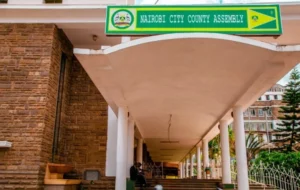Nairobi County is facing renewed political tension as MCAs press Governor Johnson Sakaja for answers over the management of the county’s revenue system, Nairobi Pay.
The controversy centers on allegations that the system’s reported revenue figures are unreliable, and that financial records are being withheld from oversight authorities.
MCAs, led by ICT Committee Chairperson Mark Ruyi, are demanding full transparency, including disclosure of the exact location of Nairobi Pay servers, which handle millions of shillings in daily collections.
The call for accountability comes amid growing doubts about how county funds are being managed.
During a recent City Hall session, MCAs openly challenged Sakaja’s administration, accusing it of providing “cooked” revenue figures without proper supporting documents.
Kayole Central MCA Jeremiah Themendu questioned the county’s daily cash flow, asking why salaries and other payments are delayed despite Nairobi Pay collecting funds every day.
These questions highlight a broader concern among elected representatives about the county’s financial practices and the inability to verify reported income.

Nairobi county assembly building. Photo Courtesy.
MCAs have repeatedly written letters seeking access to the system, but with no response, their suspicions have only deepened. They have also requested certified bank statements to cross-check revenue collections over time.
The current tensions follow the shelving of an impeachment motion against Sakaja on September 3, which was paused after a State House meeting mediated by President William Ruto.
Although that move temporarily eased the situation, unresolved grievances remain. Issues like delayed bursary disbursements, unpaid contractors, and stalled development projects continue to frustrate both MCAs and Nairobi residents. The lack of clarity on these matters has reignited political pressure on the governor.
The situation has been worsened by a leaked dossier alleging Ksh 60.8 million in questionable payments to non-existent suppliers.
These claims have intensified calls for accountability and transparency, placing the county leadership under close scrutiny.
For Governor Sakaja, these developments represent a major test of his administration’s ability to manage finances responsibly and maintain public trust.
With MCAs signaling that they could revive impeachment proceedings, Sakaja faces a critical decision. He must take swift and concrete steps to provide clear financial records, clarify outstanding payments, and demonstrate that county funds are being handled properly.
Failure to address these concerns could escalate political instability and endanger his position as governor. The unfolding situation in Nairobi underscores the growing demand for transparency and accountability in county governance, highlighting the challenges of managing public resources in a high-stakes political environment.
This episode shows that unless action is taken, the tensions between the county executive and MCAs are likely to continue, with potential consequences for both governance and service delivery in Nairobi.



